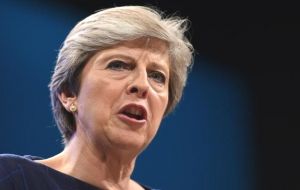MercoPress. South Atlantic News Agency
Theresa May tells MPs to be prepared for every eventuality as a hard Brexit looms closer
 Prime Minister Theresa May told MPs “real and tangible progress” had been made in Brexit talks, but the country must be prepared for “every eventuality.”
Prime Minister Theresa May told MPs “real and tangible progress” had been made in Brexit talks, but the country must be prepared for “every eventuality.” The UK has set out how it could operate as an “independent trading nation” after Brexit, even if no trade deal is reached with Brussels. Prime Minister Theresa May told MPs “real and tangible progress” had been made in Brexit talks, but the country must be prepared for “every eventuality”. However Labour said “no real progress has been made” since last June's referendum.
Mrs. May's statement comes as the fifth round of negotiations began in Brussels. Focusing on technical issues, it is the final set of talks before EU leaders meet on 19 October to decide if enough progress has been made to talk about post-Brexit relations with the UK, including trade.
European Commission spokeswoman Margaritis Schinas said “the ball is entirely in the UK court” to reach agreement on Britain's “divorce deal”, without which the EU has said it will not move on to the second phase of talks.
Mrs. May appeared to reject that in her statement to MPs, saying: “As we look forward to the next stage, the ball is in their court. But I am optimistic we will receive a positive response.”
Mrs. May also confirmed that the UK would remain subject to the rulings of the European Court of Justice during a planned two-year transition period after Britain leaves the EU in March 2019.
Responding to a challenge from Eurosceptic Conservative MP Jacob Rees-Mogg, she told MPs the need to ensure the minimum of disruption “may mean that we will start off with the ECJ still governing the rules we're part of for that period”.
She said it was “highly unlikely” any new EU laws would come into force during the transition, but did not rule out the possibility that any which did so would have effect in Britain.
The prime minister rejected existing models for economic co-operation, such as membership of the European Economic Area or the Canadian model, calling instead for a “creative” solution that would be “unique” to the UK.
But she also stressed - as she has done before - that the government was preparing for “every eventuality,” reinforcing her long-held position that walking away without a deal is a possibility.
She rejected a call from a Tory MP to name a date when the UK would walk away from talks without an agreement, saying “flexibility” was needed.
On Northern Ireland, she said the government had begun “drafting joint principles on preserving the Common Travel Area, and associated rights and we have both stated explicitly we will not accept any physical infrastructure at the border”.
The two White Papers give the most detail yet of contingency planning that is under way.
Labour leader Jeremy Corbyn said the government had spent the 15 months since the EU referendum “squabbling amongst themselves” and were making a “mess” of Brexit.
He urged Mrs May to unilaterally guarantee the rights of EU citizens in the UK, as well as criticising the lack of progress on Northern Ireland.
The SNP's leader at Westminster, Ian Blackford, said there had not been a single mention of the devolved administrations in Mrs May's speech, as he called for urgent action on EU citizens' rights.
The Liberal Democrats, who want a referendum on any final Brexit deal, urged the prime minister to “show real leadership” by ring-fencing the issue of EU citizens' rights, confirming the UK will remain in the single market and customs union and firing Foreign Secretary Boris Johnson.
Jacob Rees-Mogg told the BBC he was “troubled” by the PM's statement: “If we're remaining under the jurisdiction of the ECJ then we haven't left the European Union or the date of departure is being delayed.”
But Boris Johnson said the UK would “still be able to negotiate proper free trade deals” during the transition period.
”She (Theresa May) has reaffirmed the destination of a self-governing, free-trading, buccaneering and Global Britain taking back control over our laws, money, and borders,” he said in Facebook post.




Top Comments
Disclaimer & comment rules-

-

-

Read all commentsBuccaneering Britain - oh dear. Where is Trollboy when you need him?
Oct 10th, 2017 - 12:02 pm 0Brexiters are so damn impatient, they've got what they wanted but all they can do is whine that it's taking too long and they want to quit absolutely everything NOW.
As for taking back control, we already have control of our money because we're not in the Euro, and of our borders because we're not in Schengen, and we still control most of our laws and have a say in the rest. Boris is full of shit as usual.
You mean, I was right all these years?
Oct 11th, 2017 - 02:25 am 0No surprise to me, I warned of the fourthreichization of Britain.
You better get ready, Trollboy. Argentina is first on the list, we're coming for you!
Oct 11th, 2017 - 08:40 am 0Commenting for this story is now closed.
If you have a Facebook account, become a fan and comment on our Facebook Page!